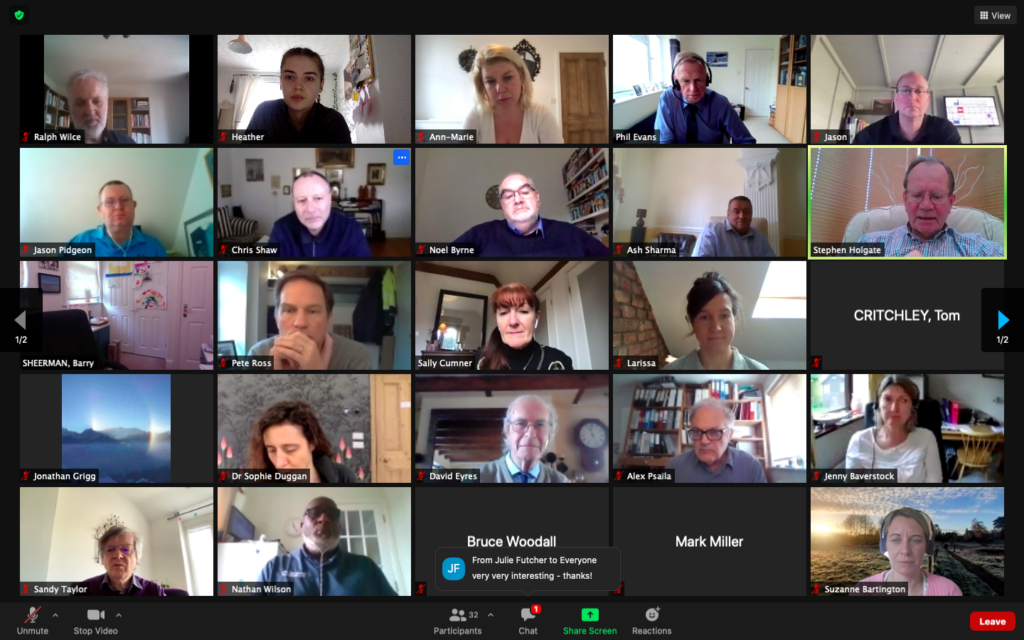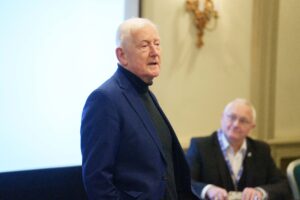Guest speaker Professor Philip Evans discussed the importance of informing and involving all healthcare professionals on air pollution and the challenges surrounding air quality in and around general practices.
In the first Air Health working party meeting of this year, Professor Sir Stephen Holgate, Chair of the Air Health working party, chaired the discussion about the crucial role healthcare professionals can play in addressing the effects of air pollution and improving public health. Guest speaker Professor Philip Evans, GP and Primary Care, Exeter University, presenting on the topic of engaging with healthcare professionals.
Professor Evans, who retired after over 30 years as a GP, and now works in academic research, identified that air pollution should primarily be responded through the healthcare profession. Globally, 23 per cent of deaths could be prevented through healthier environments, with ambient air pollution causing 4.2 million premature deaths, according to the World Health Organisation.
From Professor Philip Evans’ perspective, the presentation outlined the key challenges that surround engaging with healthcare professionals on the matter of air pollution. These included how evidence with a sound scientific basis should be communicated, linking the effects of poor air quality in the press, and identifying practical barriers restricting healthcare professionals, such as time, knowledge and incentives.
However, Professor Evans reinforced that primary care would play a key role in addressing air quality through advocacy, awareness training, tools to measure the health effect of air pollution, feedback to patients, and mapping attitudes with evidence.
Professor Evans further revealed the scope to make general practices healthier environments for visitors, which entails looking at reducing carbon footprint, providing green impact health toolkits, and endorsement of becoming a green practice as part of the ‘net zero NHS 2040’ scheme.
The presentation provoked numerous questions from attendees, including Sandy Taylor, a member of the Royal Town Planning Institute of the West Midlands Region asked: ‘What role should general practices play in considering air quality if they are akin to small businesses, and the interests of shareholders could conflict with public health?’
Professor Philip Evans responded that most GP practices are based on a partnership model with GPs as directors, meaning they behave as small businesses. Therefore, if there was a free resource to improve general practices’ air quality, they would respond, especially as going green is an excellent thing in the public eye.
Another question from Dr Mark Miller, Senior Research Scientist at the University of Edinburgh, addressed how often air quality is generally raised by patients and under what circumstances. Professor Evans responded that patients do not bring up air pollution often, but it would usually be around damp in the home and its effect on children with asthma. Patients are proactive on the impact of passive smoking, but less so on ambient air pollution.
Ralph Wilce, the founder of Wijs-Air and WCRAQ Chair of Air Monitoring, asked: ‘What recommendations are available for taking practical steps to reduce exposure to indoor air pollution coming from outside? How effective are air purifiers? Would a standardised test method proposed for the IEC63086 help judge their efficacy on target pollutants?’
Professor Evans agreed that there need to be solutions for people in high pollution areas, which are mainly socially deprived. These people do not have the resources to move away. He explained that ‘healthcare is self-care’ and behaviours that reduce exposure should be encouraged with practical tools based on sound evidence.
The meeting was well attended, with other academics including Professor Jonathan Grigg from Queen Mary University London, Dr Suzanne Bartington from the University of Birmingham, and Professor Jonathan Grigg from Imperial College London. Other experts in their fields who attended were from Arriva Digital, Climate 22, Allison Transmission, Global Action Plan, Wijs-Air, and GBF Ltd.
If you have any suggestions, recommendations for members, or know of funding opportunities, please email sally.cumner@supatrak.com.




